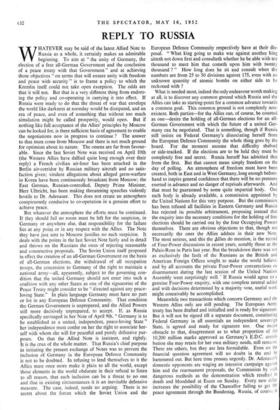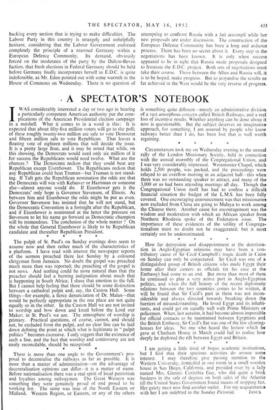REPLY TO RUSSIA
WHATEVER may be said of the latest Allied Note to Russia as a whole, it certainly makes an admirable beginning. To aim at "the unity of Germany, the election of a free all-German Government and the conclusion of a peaoe treaty with that Government" and at achieving those objectives "on terms that will ensure unity with freedom and peace with security" is to frame a policy to which the Kremlin itself could not take open exception. The odds are that it will not. But that is a very different thing from endors- ing the policy and co-operating in carrying it into effect. If Russia were ready to do that the threat of war that envelops the world like darkness at noonday would be dissipated, and an era of peace, and even of something that without too much simulation might be called prosperity, would open. But if nothing like full acceptance of the Allies' principles by Moscow can be looked for, is there sufficient basis of agreement to enable the negotiations now in progress to continue ? The answer to that must come from Moscow and there is not much ground for optimism about its nature. The omens are far from favour- able. Since the last Soviet Note was received on April 10th (the Western Allies have dallied quite long enough over their reply) a French civilian air-liner has been attacked in the Berlin air-corridor by Russian military aircraft and no satis- faction given; virulent allegations about alleged germ-warfare in Korea have been continuously broadcast from Moscow; the East German, Russian-controlled, Deputy Prime Minister, Herr Ulbricht, has been making threatening speeches violently hostile to Dr. Adenauer. This does not create an atmosphere conspicuously conducive to co-operation in a genuine effort to achieve peace.
But whatever the atmosphere the efforts must be continued. If they should fail no room must be left for the suspicion, in Germany or anywhere else, that responsibility for the failure lies at any point or in any respect with the Allies. The Note they have just sent to Moscow justifies no such suspicion. It deals with the points in the last Soviet Note fairly and in detail and throws on the Russians the onus of rejecting reasonable and constructive proposals. The Soviet Union itself proposed in effect the creation of an all-German Government on the basis of all-German elections, the withdrawal of all occupation troops, the concession to Germany of the right to maintain a national army—all, apparently, subject to the governing con- dition that the united Germany should not enter into such a coalition with any other States as one of the signatories of the Peace Treaty might consider to be "directed against any peace- loving State." In plain language Germany must have no part or lot in any European Defence Community. That condition the German Government is unprepared, and the Allied Powers still more decisively unprepared, to accept. If, as Russia specifically envisaged in her Note of April 9th, "Germany is to be established as a united, independent, peace-loving State" her independence must confer on her the right to associate her- self with whom she will for peaceful and purely defensive pur- poses. On that the Allied Note is insistent, and rightly. It is the crux of the whole matter. That Russia's chief purpose in initiating the present exchange of Notes was to prevent the inclusion of Germany in the European Defence Community is not to be doubted. In refusing to lend themselves to it the Allies must once more make it plain to all the world, except those elements in the world obdurate in their refusal to listen to all reason, that such inclusion can be a threat to no one and that in existing circumstances it is an inevitable defensive measure. The case, indeed, needs no arguing. There is no secret about the forces which the Soviet Union and the European Defence Community respectively have at their dis- posal. "What king going to make war against another king sitteth not down first and consulteth whether he be able with ten thousand to meet him that cometh upon him with twenty thousand ? " How long does he sit and consult when the numbers are from 25 to 50 divisions against 175, even with an unknown quantity of atomic bombs on either side to be reckoned with ?
What is needed most, indeed the only endeavour worth making at all, is to discover any common ground which Russia and the Allies can take as starting-point for a common advance towards a common goal. This common ground is not completely non- existent. Both parties—for the Allies can, of course, be courited as one—desire the holding of all-German elections for an all- German Government with which the future of a united Ger- many can be negotiated. That is something, though if Russia still insists on Federal Germany's dissociating herself from the European Defence Community the whole thing goes by the board. For the moment assume that difficulty shelved or side-tracked. If the elections are to be held they must be completely free and secret. Russia herself has admitted that from the first. But that cannot mean simply freedom on the day of polling. An atmosphere of freedom must have been created, both in East and in West Germany, long enough before- hand to inspire general confidence that there will be no pressure exerted in advance and no danger of reprisals afterwards. And that must be guaranteed by some quite impartial body. One such body is already available, a commission appointed by the United Nations for this very purpose. But the commission has been refused all facilities in Eastern Germany and Russia has rejected its possible arbitrament, proposing instead that the enquiry into the necessary conditions for the holding of free elections should be carried out by the four Occupying Powers themselves. There are obvious objections to that, though not necessarily the ones the Allies adduce in their new Note.
The most serious, and this the Allies do mention, is the record of Four-Power discussions in recent years, notably those at the Palais-Rose in Paris last year. But the breakdown there was not as exclusively the fault of the Russians as the British and American Foreign Offices sought to make the world believe, and by all accounts the private Four-Power conversations on disarmament during the last session of the United Nations Assembly went surprisingly well. If Russia would agree to a genuine Four-Power enquiry, with one complete neutral added and with decisions determined by a majority vote, useful work might conceivably be accomplished.
Meanwhile two transactions which concern Germany and the Western Allies only are still pending. The European Army treaty has been drafted and initialled and is ready for signature. But it will not be signed till a separate document, constituting Federal Germany in all essentials an independent sovereign State, is agreed and ready for signature too. One major obstacle to that, disagreement as to what proportion of the 10,200 million marks approved as Germany's E.D.C. contri. bution she may retain for her own military needs, still remains. There are others, but they are less formidable. Even on the financial question agreement will no doubt in the end be hammered out. But here time presses urgently. Dr. Adenauer's domestic opponents are waging an intensive campaign against him and the rearmament proposals, the Communists by such dangerous methods as the demonstration which resulted in death and bloodshed at Essen on Sunday. Every new delay increases the possibility of the Chancellor failing to get the peace agreement through the Bundestag. Russia, of course, is backing every section that is trying to make difficulties. The Labour Party in this country is strangely and unhelpfully hesitant, considering that the Labour Government endorsed completely the principle of a rearmed Germany within a European Defence Community. Its demand, obviously forced on the moderates of the party by the Dalton-Bevan faction, that fresh elections in Federal Germany should be held before Germany finally incorporates herself in E.D.C. is quite indefensible, as Mr. Eden pointed out with some warmth in the House of Commons on Wednesday. There is no question of attempting to confront Russia with a fait accompli while her new proposals are under discussion. The construction of the European Defence Community has been a long and arduous process. There has been no secret about it. Every step in the negotiations has been known. It is only when success appeared to be in sight that Russia made proposals designed to frustrate the E.D.C. project. Both sets of negotiations must take their course. Those between the Allies and Russia will, it is to be hoped, make progress. But to jeopardise the results so far achieved in the West would be the very reverse of progress.



































 Previous page
Previous page